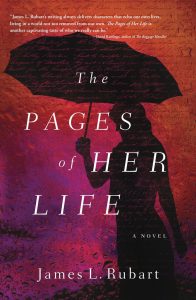by James L. Rubart, @jameslrubart
Back in 1992, bestselling author Mona Simpson offered 13 maxims for the writing journey in the The Writer magazine. I’m going to list eight of them I think are still particularly powerful along with some quick comments on each of them from me.

“The decision to become an artist is one that must be made or recognized alone.”
This is the foundation. No one can tell you you’re a writer. They can suggest it, but you’re the one who must know it in your gut. And (this is key) no one can tell you you’re not a writer. It’s your choice.
“Try as much as possible, to develop a faith in yourself.”
This plays well off the first maxim. Yes, you must decide every day if you’re a writer, but even more critical, you must choose every day if you’re going to believe in yourself. Perception is everything. If you perceive yourself to be a writer, if you know you have something inside worth shouting to the world, you will be a writer and you will craft words that need to be read. So choose wisely every day what you believe.
“Invest in yourself.”
Invest money, invest time, invest taking care of your health, invest in surrounding yourself with friends who will champion this crazy journey, invest in writing instead of watching Netflix, invest by waking up 30 minutes earlier… and the list goes on. If you want this, really want it, invest well.
“Perfect is the enemy of good.”
My friend Roy Williams says, “Anything worth doing, is worth doing badly.” Just do it. It’s the only way to learn.
“No one can teach you the specifics of how to write a novel.”
It’s tempting to say there’s one way to write a novel. Nope. That’s like saying there’s one way to cook a meal. Darci and I have been watching old episodes of Master Chef and it’s fascinating to me how many different ways the competitors will cook, even when they’re given the exact same ingredients. How did they figure out the way to cook their versions? By figuring out their own specifics. Same thing with a novel.
“As much as possible, discover which form you are most comfortable writing in.”
Maybe the strongest way of expressing yourself isn’t novels. Maybe it’s short stories. Maybe it’s plays. Maybe it’s screen plays. Maybe it’s narrative non-fiction. Maybe it’s memoirs. What form are you most at home writing? If you’ve never asked that question, now might be the time.
“Read great books.”
Yes, you have to read in your genre, but how many classics have you taken in? How many stories outside your norm have you read lately? A couple Christmases ago, Taylor bought me East of Eden. Truthfully, I never would have picked it up if he hadn’t given it to me. And wow, I was seriously impacted by that novel; in my writing, in my view of people, my view of life.
“Practice reading aloud.”
You’ve likely heard this one often, but it’s a good reminder that when we read our words out loud we hear them differently. We instinctively know what works and what doesn’t when we’re listening to our prose through our own ears. If you’ve never tried, do it!
“Practice reading aloud.”
We’ve talked about this a number of times before, but a good reminder that when we read our words out loud we hear them differently. We instinctively know what works and what doesn’t
Your Turn
What writing maxims have you learned, been reminded of, and/or embraced during the first half of 2020?

How Do You Stand Up for Yourself When It Means Losing Everything? Allison Moore is making it. Barely. The Seattle architecture firm she started with her best friend is struggling, but at least they’re free from the games played by the corporate world. She’s gotten over her divorce. And while her dad’s recent passing is tough, their relationship had never been easy. Then the bomb drops. Her dad was living a secret life and left her mom in massive debt. As Allison scrambles to help her mom find a way out, she’s given a journal, anonymously, during a visit to her favorite coffee shop. The pressure to rescue her mom mounts, and Allison pours her fears and heartache into the journal. But then the unexplainable happens. The words in the journal, her words, begin to disappear. And new ones fill the empty spaces—words that force her to look at everything she knows about herself in a new light. Ignoring those words could cost her everything . . . but so could embracing them.

James L. Rubart is 28 years old, but lives trapped inside an older man’s body. He thinks he’s still young enough to water ski like a madman and dirt bike with his two grown sons. He’s the best-selling, Christy BOOK of the YEAR, CAROL, INSPY, and RT Book Reviews award winning author of ten novels and loves to send readers on journeys they’ll remember months after they finish one of his stories. He’s also a branding expert, audiobook narrator, co-host of the Novel Marketing podcast, and co-founder with his son, Taylor, of the Rubart Writing Academy. He lives with his amazing wife on a small lake in Washington state.
